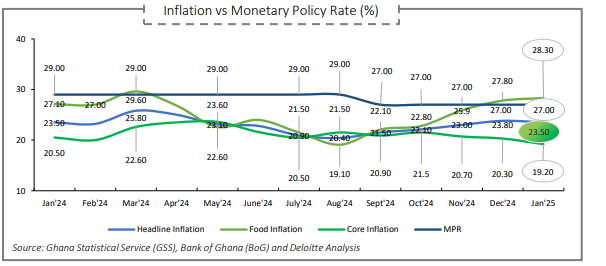
Consumer spending in Ghana is expected to slow down in the coming months, Deloitte West Africa has predicted in its February 2025 Inflation Update.
According to the professional services firm, this stems from economic uncertainties.
Ghana’s inflation experienced a first decline in four months in January 2025 to 23.50%.
Similarly, the monthly inflation slowed to 1.7% from 1.8% in December 2024.

Food prices also continued to rise despite disinflation.
Deloitte added that the Bank of Ghana is likely to maintain the status quo on its monetary policy rate as part of its monitoring inflation.

Price Pressure in Nigeria to Persist in 2025
Meanwhile, Deloitte has indicated that the price pressures in Nigeria will persist in 2025 due to upside risks.
It added that the anticipated increase in tariffs (electricity, telecoms), global commodity price shocks, ongoing food security and seasonality effect.
It continued that the Monetary Policy Committee (MPC) is likely to adopt a wait-and-see approach to evaluate the impact of base effects and policy reforms on inflation.
It therefore wants proper policy mix and balancing act required as a premature cut on interest rates may erode recent gains achieved.
It concluded that government reforms need to be targeted at addressing food insecurity to complement.
Nigeria’s inflation falls sharply to 24.48% in January 2025 following the reconstitution of the consumer price index.
Core inflation fell to 22.59% in January 2025 from 29.28% in December 2024. Food inflation also went down to 26.08% in January 2025 from 39.84% in December 2024.
joynews


























